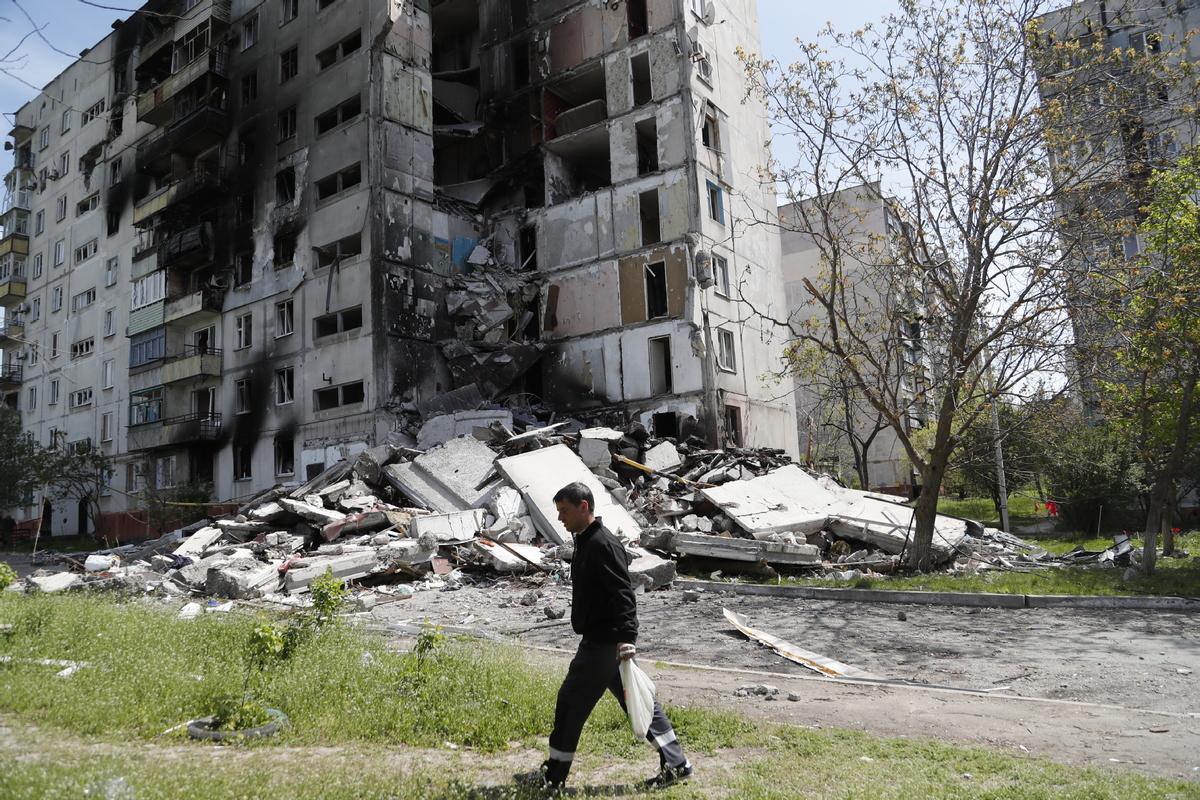War and sanctions hurt civilians the most
By Qin Wenyan | chinadaily.com.cn | Updated: 2022-05-11 10:47

According to the United Nations Refugee Agency (UNHCR), as of March 31, about 4 million people have fled Ukraine, 6.5 million were internally displaced and 13 million were stranded in conflict-affected areas. Ukraine is currently facing a massive humanitarian crisis. Moreover, after two months of the initial outbreak of conflict, the crisis continues to worsen.
On April 26, US Defense Secretary Austin, who had just visited Ukraine, held a meeting with senior military officials from more than 40 countries at the US Army Ramstein Air Force Base in Germany to discuss the conflict between Russia and Ukraine and the issue of sharing military assistance with Ukraine. A day earlier, Austin and US Secretary of State Blinken in a high-profile manner after their meeting with the Ukrainian president said that "the United States wants to see a weakened Russia." The New York Times said that the essence of the current Russian-Ukrainian conflict has changed from a "struggle for control of Ukraine" to a "war of direct confrontation between the United States and Russia".
Previously, in the fifth round of negotiations between Russia and Ukraine, the United States had publicly questioned the sincerity of Russia, insisting that Ukraine should not relax its vigilance. US Deputy Treasury Secretary Wally Adeyermo also announced on March 29 that the United States and its allies plan to impose new sanctions on several key Russian industries. "In addition to sanctioning the companies that support the Kremlin's activities, we also plan to take action to disrupt their critical supply chains."
These sanctions of just the tip of the iceberg, With the sanctions imposed by Western countries on Russia's economy, airspace, energy and other fields, some organizations and companies in the sports and cultural circles that once advocated as "apolitical" have also joined the team of sanctions against Russia. Innocent athletes, well-known deceased writers and even the cats dancing to Russian music are on the sanctions list.
All-round, these undifferentiated or even preposterous sanctions have undoubtedly complicated the changing situation. We can see that because of how complicated the historical entanglements, ethnic conflicts and security concepts are between Russia and Ukraine, there are different judgments on what is right and what is wrong. But, from a logical perspective, the outbreak of war will disproportionally hurt civilians from both sides. Death, physical and mental damage have been inevitably integrated into the genes of a generation since the start of this war.
This is well confirmed from the past wars in Afghanistan. More than 46,000 Afghan civilians have died and about 11 million have become refugees during the war, according to statistics released by Brown University. In May 2021, the US withdraw from Afghanistan accelerated and the situation deteriorated sharply. The Taliban and Afghan government forces fought street battles in major cities, causing heavy civilian casualties. "The ongoing conflict in the city is a constant massacre, and the civilians are paying the highest price" the UN Secretary-General Antonio Guterres said.
Physical pain can be treated, but lost life cannot be returned. The psychological trauma and emotional estrangement shared between the Afghan people may never heal. Under such circumstances, sanctions cannot become a fundamental and effective way to solve the problem, but rather greatly harm the interests of civilians, aggravate the hatred between the two sides, reduce communication opportunities and the possibility of successful negotiations and, ultimately, "add fuel to the fire."
For example, last year, the United States announced a freeze on the overseas storage of Afghanistan's central bank, prompting local protests in Kabul and fueling anti-American calls in Afghanistan. The broader international community as well also feels controversially about the sanctions. The New York Times said the sanctions against the Taliban regime paralyzed Afghan banks and blocked humanitarian relief efforts in Afghanistan——"the Afghan people were deeply damaged by the sanctions."
In the Ukraine crisis, economic sanctions have reached an unprecedented scale, which will even further trigger serious crises in global economy, trade, finance, energy, food, the industrial chain and supply chain, undermine international cooperation and make the world economy even more difficult under the epidemic, thus affecting the lives of people around the world.
Attempts to solve the problems through sanctions are inherently wrong. The current adjustment of the US strategy towards Russia has undoubtedly increased the danger of the situation and is likely to bring another huge catastrophe to the civilians of the two countries.
The more complex the situation, the more necessary to consider the consequences of actions taken. To deal with international and regional hotspot issues, we have many options, not just war or sanctions, and civilians should never pay for geopolitical conflicts or major-country confrontation.
The situation in Ukraine has divulged to a point that all peace-loving people are not happy to see. But it must be clear that dialogue is the only effective way to prevent the situation from escalating again.
At present, the international community needs to respect and accommodate the legitimate and reasonable demands of all parties, promote dialogue and exchanges between Russia and Ukraine on the basis of the supremacy of the people's interests. Only in this way can the conflict between the two sides be alleviated and peace will truly come.
Qin Wenyan is a student at the Communication University of China.
The opinions expressed here are those of the writer and do not necessarily represent the views of China Daily and China Daily website.
If you have a specific expertise, or would like to share your thought about our stories, then send us your writings at opinion@chinadaily.com.cn, and comment@chinadaily.com.cn.
























